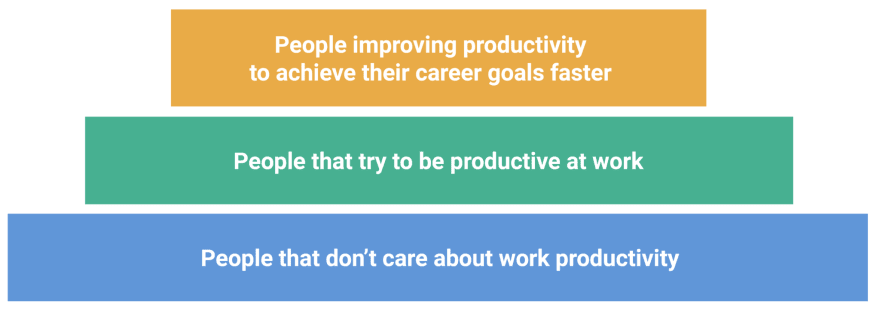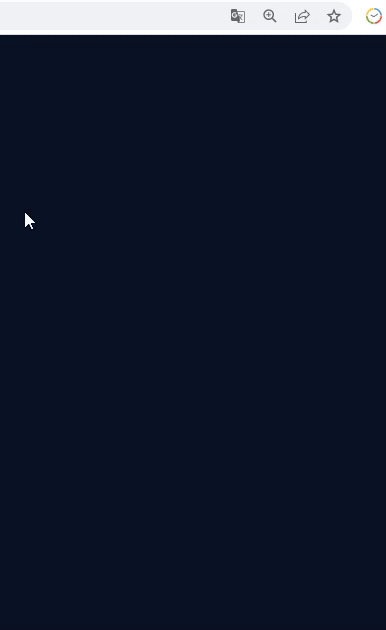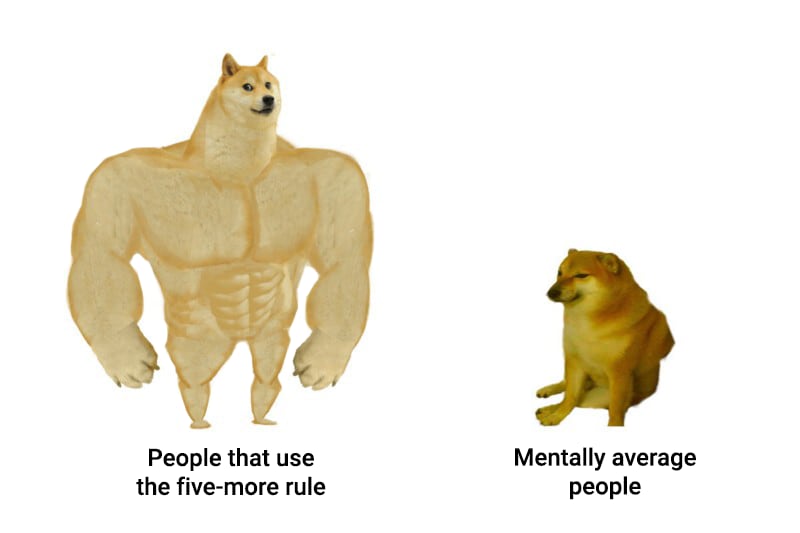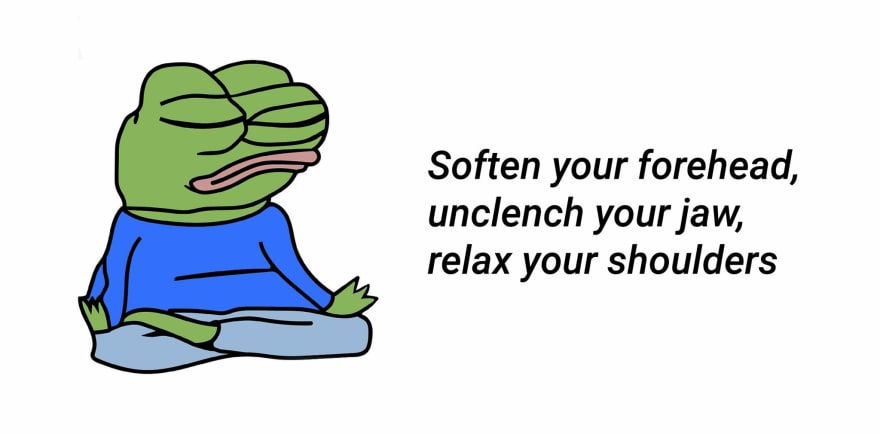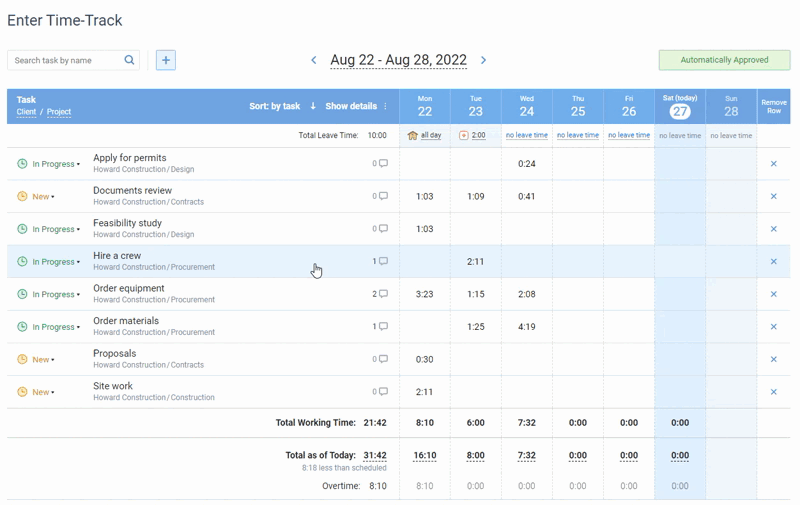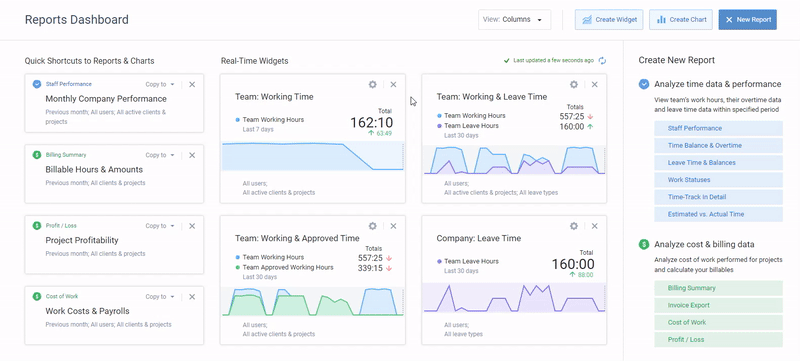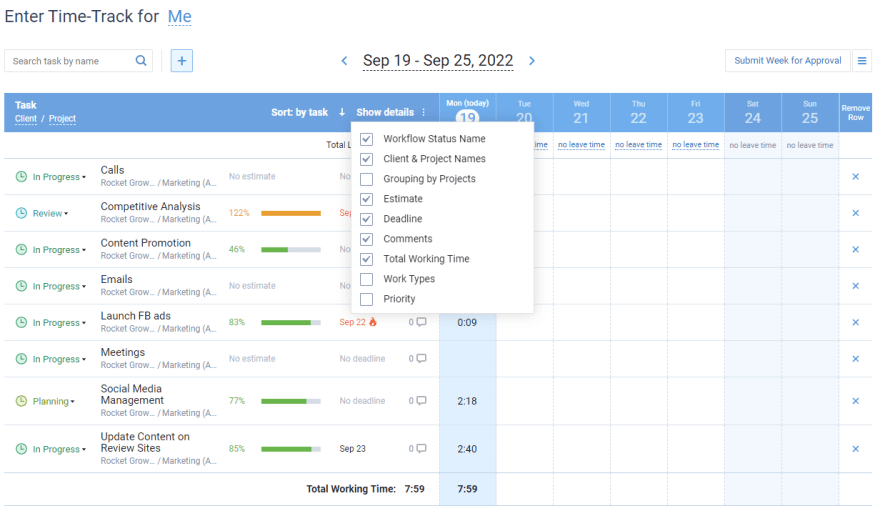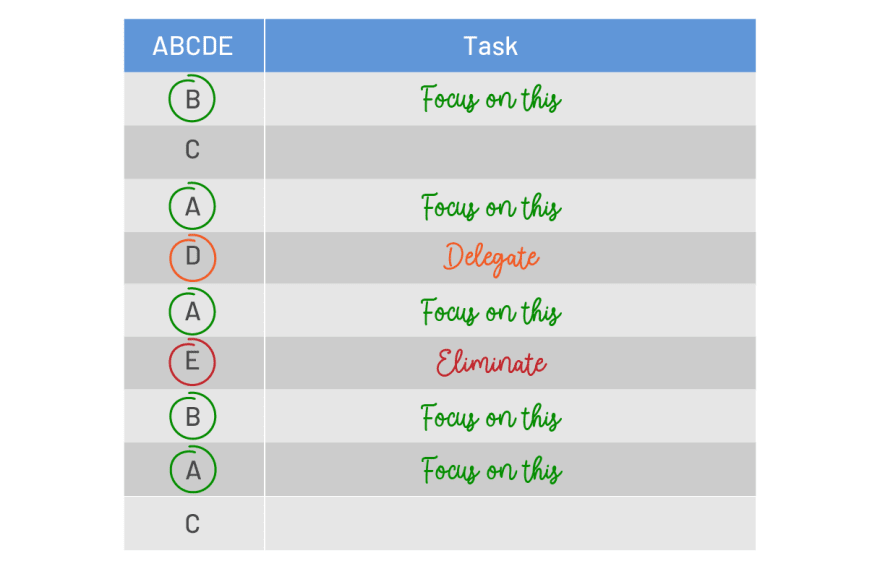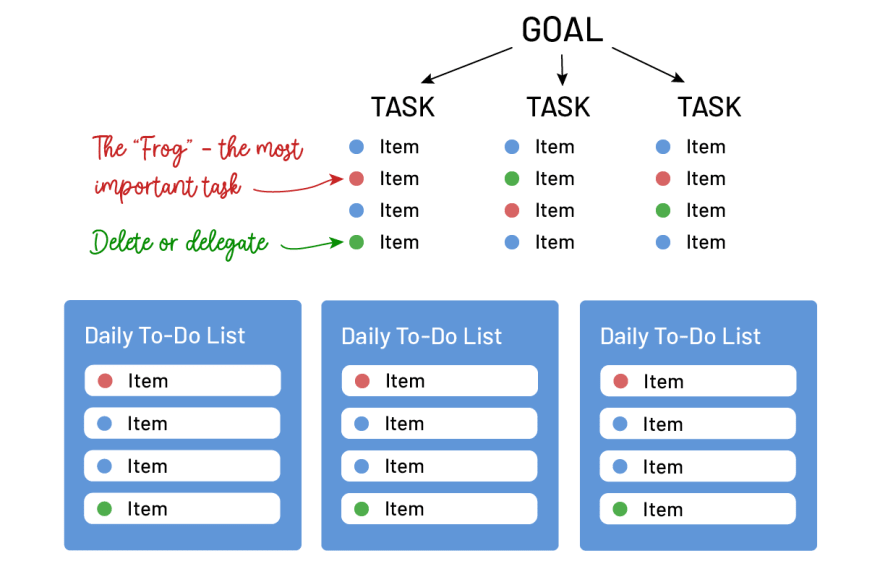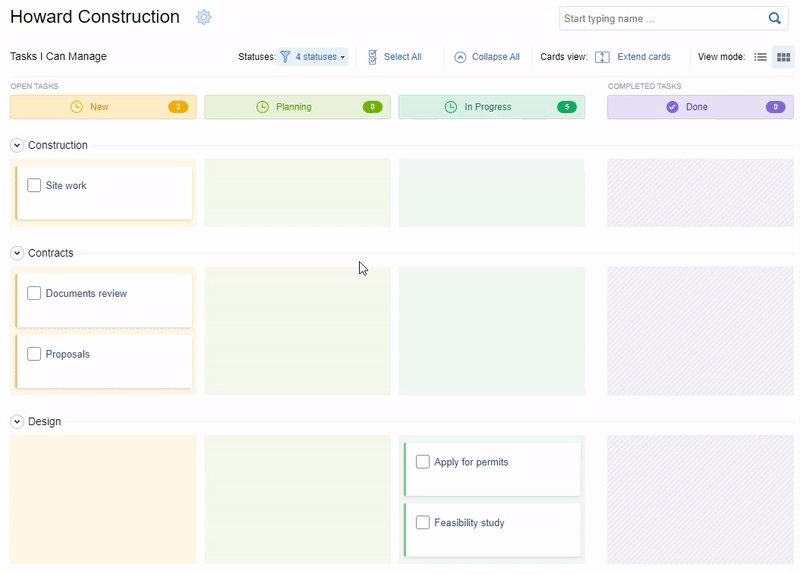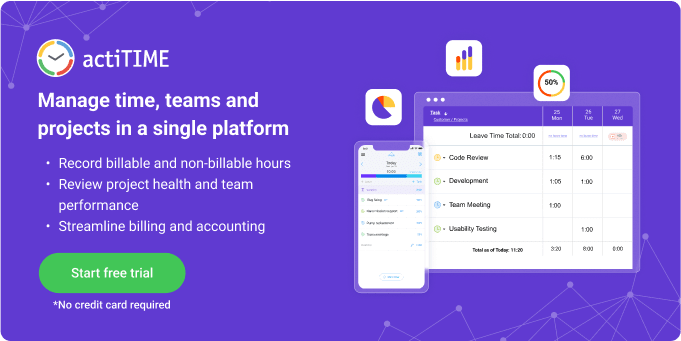An Interest In:
Web News this Week
- April 19, 2024
- April 18, 2024
- April 17, 2024
- April 16, 2024
- April 15, 2024
- April 14, 2024
- April 13, 2024
32 Effective Ways to Increase Productivity at Work ( Tools)
If you want to increase your productivity at work but are tired of reading articles advising you to get better sleep and manage distractions, you will enjoy the 32 tips listed in this article. You will learn to do more in less time, manage stress, overcome procrastination, improve work performance, and advance your career faster. Bookmark or share this page to return to it later.
Table Of Contents
Manage Your Attention
- Plan your day
- Control your environment
- Check with your goals
Enhance Concentration
- Start a timer
- Quit using pomodoros
- Try the Flowtime technique instead
- Limit social media consumption
- Develop mental strength
- Take better care of your health
- Unload your mind
- Try meditation
- Consult with doctor
Improve Work Performance
- Automate routines
- Improve routine tasks
- Use peak productivity time
- Ask for feedback
- Learn to handle criticism
Master Time Management
- Track time
- Estimate activities
- Set deadlines
- Reflect on your performance regularly)
Improve Work Prioritization
- Use the Ivy Lee method
- Apply the Pareto principle
- Implement the ABCDE approach
Overcome Procrastination & Burnout
- Break down big projects
- Get comfortable with imperfection
Manage Stress
- Identify your stressors
- Develop healthy responses
Build Hard Skills
- Hone your professional skills
- Know your tools
Manage Your Attention
The sharpness of attention is a key predictor of work productivity and rapid career growth. If you are distracted all the time or, even worse, do not know where you are going, no effort will be favorable. Laser-focusing attention is the first step towards productivity and mastery at work.
Where your attention goes, your time goes. Idowu Koyenikan
1. Plan your day
Daily planning is essential for several reasons:
- it cuts through the noise and makes you focus on what is important
- it reduces stress as you know what to expect from your day and how to ace every task
- it helps you maintain the work-life balance
Moreover, daily planning is a smart way to trick your brain into achieving short-term goals. Every time you cross out a task from your list, your brain releases dopamine a hormone that gives us a sense of satisfaction, improves concentration, and makes you want to experience this energy boost again. Doing daily tasks one by one will help you get through your day efficiently and stress-free.
**Pro tip: **One of the best ways to gauge your attention on daily tasks is to bring technology along. Choose a task tracker that suits your taste, plan your weeks, prioritize tasks, and track time to see how productive you are.
2. Control your environment
If you dont take your attention under control, your environment will: notifications, messages, chatty colleagues, an unfinished chocolate bar on your table you name it. Follow these steps to overcome distractions and own your environment:
- Identify things and activities that are stealing your attention
- Block time for work-related distractions like answering instant messages and emails
- Notify others about your availability
- Eliminate the rest (close the door, put on headphones, etc.)
Pro tip: Document your distractions for a week and record ideas on how you can manage them.


Background Music for Coding for Every Taste
Anastasia for actiTIME Inc Apr 20 '21 3 min read
3. Check with your goals
Do you know why you do the job that you do? Are you building new skills and expanding your expertise, or are you just doing what youve been told? If your answer is the latter, you can stop right here, recap the first two tips and close this tab theres no use in becoming productive without a direction.
On the contrary, if you have your whys and a strategy you follow, we welcome you on board. The next tips will boost your work productivity and help you grow faster.
The tragedy of life doesnt lie in not reaching your goal. The tragedy lies in having no goal to reach. Benjamin E. Mays
Pro tip: Create and follow your career development plan a document outlining your career goals and an action plan for reaching your professional goals. Check with it from time to time to see where you are going and how well you are doing.


20 Productivity Tips From Developers to Developers
Anastasia for actiTIME Inc Mar 13 11 min read
Enhance Concentration
Concentration is the ability to give your attention or thought to a single object or activity and resist distractions. The bad news is that no tips or tricks will help you improve your concentration overnight. The good news is that concentration is much like a mental muscle, and you can build it up and strengthen it with practice.
The highest form of work is that which is done with the deepest concentration. Dr Prem Jagyasi
4. Start a timer
Whenever you start or continue working on a task, start a timer. The trick here is that a timer makes you focus on a single task until you take a break or finish it and stop the timer. The best timers are those in time tracking apps: you can add your tasks, start timers to record the time spent on them, and review your productivity in a few clicks.
actiTIMEs time tracking extension for Chrome pick a task, start a timer, press stop to update your timesheet and review productivity
5. Quit using pomodoros
Pomodoros damage productivity, period. The Pomodoro technique is supposed to increase your concentration and prevent interruptions. In fact, it either forces you to work longer than you are comfortable with or interrupts you when you are fully engaged in the work. Moreover, Pomodoros prevent you from getting into a flow state a state of deep focus and high and effortless productivity because Pomodoros are short bursts of effort, which is opposite to how our brains work.
Pomodoros interrupt concentration and prevent from achieving peak productivity


How to Help Developers Work in The Flow
Anastasia for actiTIME Inc Jun 30 '21 11 min read
6. Try the Flowtime technique instead
The Flowtime technique was developed as a solution to Pomodoros problems. It requires you to write down the one task you will work on and record the start time or start timer. Next, you work for as long as you are comfortable with and center your focus and thoughts on a single task. Whenever you feel tired or distracted, you need to record the stop time or stop the timer and take a break for however long you need to feel refreshed.
7. Limit social media consumption
Social media is not only an addictive time waste but also a thing that damages mental health and wellbeing, including adverse effects on work productivity. Numerous studies have shown that social media causes anxiety, depression, unhealthy sleep patterns, stunted creativity, reduced self-esteem, distracts from life and work goals, and so on. Heres how it works:
Whenever you reach your phone, open your favorite app and give it a few harmless scrolls, a pleasure hormone is released into your brain, making the brain crave it more and less willing to be disciplined. So, you either surrender to media corporations or take your work and career under control.
Brain of a regular social media consumer
Here are a few tips on how to break this habit:
- Pick the time of day when you are allowed to use social media. Lets say, during lunch or your daily commute.
- Replace that time void with something meaningful. Instead of voluntarily giving up on your mental health, you can have a walk to increase concentration or talk to others in person to release stress.
8. Develop mental strength
Discipline is like a muscle: the more you train it, the more determined and strong-willed you become. The five-more rule is one of the simplest ways of building mental strength. The idea is simple: whenever you feel like quitting or losing concentration, tell yourself to do five more of whatever you are doing.
Lets say you are compiling a work report and start feeling tired. Instead of taking a break immediately, outline five more points or write five more paragraphs. Find the energy deep within to do five more and become more concentrated the next time you get back to work.
9. Take better care of your health
Work productivity begins with a lifestyle. Quality nutrition gives the body the right macronutrients, vitamins, and minerals to function. Regular physical activity relieves stress, improves memory, helps get better sleep, and boosts mood and concentration. Finally, sleep deprivation leads to lower alertness and concentration and impairs judgment. So, review your lifestyle and build healthy habits to lay a solid foundation for productivity at work and in life.
Typically, people who exercise start eating better and becoming more productive at work. They smoke less and show more patience with colleagues and family. They use their credit cards less frequently and say they feel less stressed. Its not completely clear why. But for many people, exercise is a keystone habit that triggers widespread change. Charles Duhigg
10. Unload your mind
An unstable and wandering mind results from uncontrolled thoughts, ideas, and feelings swarming in your mind. Luckily, unloading your mind is easy you need to write out everything that bothers you. If you think of all the things you need to do this week, take your time to list them in a task management app and get back to work. If you are stressed or worried about something, pour your feelings out on paper, and you will feel more focused immediately.
11. Try meditation
Meditation is a powerful tool that changes the structure and function of the brain, reduces stress, anxiety, and depression, increases focus and concentration, and improves memory and attention span. In other words, meditation reduces stress and mind wandering, releasing brain power for tasks that matter.
Heres how Robert Greene, a best-selling author of books on power, describes his experience of daily 35-minute meditations: it allows me to focus on how things really are instead of being inside the same circle of recurring thoughts [] it keeps me afloat during the entire day. It puts me in a good mood that will last quite a while. Not forever, but quite a while.
Pro tip: If you are new to meditation, try guided meditation apps. After starting one, you will be given simple instructions guiding you through the process. After you get some experience, you will be able to meditate anytime and anywhere.
12. Consult with doctor
If you have a hard time concentrating at work, experience loss of motivation, low energy, and change in eating and sleeping habits, do not ignore it. These might be symptoms of burnout, anxiety, ADHD, or depression. Instead of pushing yourself even harder and reading productivity and time management hacks, you need to see your doctor about them immediately. Otherwise, your symptoms may worsen, and you will need more time to recover.


How to Prevent or Recover from Developer Burnout
Anastasia for actiTIME Inc Jun 20 '21 15 min read
Improve Work Performance
Work performance is how well a person fulfills the duties of their role, completes their tasks, and behaves in the workplace. In this chapter, youll learn how to improve your works quality, quantity, and efficiency the three key performance measurements.
13. Automate routines
Any job has routine tasks that usually take up a significant portion of your working hours. Fortunately, there are hundreds of tools online that can do them for you, saving hours and days of your time in the long run. Google automating tools for professional needs and task management tools. For example, explore the functionality of Zapier and IFTTT automation software for general use. Using Grammarly alone to check your emails before sending them will save you a great deal of time and save you from email-sending anxiety
Online timesheet interface in actiTIME where users can track time
and fine-tune their timesheet to their liking
14. Improve routine tasks
Not any routine can be automated some require your attention and effort. To tackle routine tasks faster and more effectively, you must ask yourself what you can do to manage them more effectively.
For example, if you spend a few hours answering emails weekly, you can create email templates, set up spam filters, review email sorting settings, use tools such as Unroll.me to unsubscribe from unnecessary newsletters in bulk, and so on. Alternatively, if you perform the same routines repeatedly, you can document them in tools such as Notion.
15. Use peak productivity time
According to science, everyone experiences times when they are most focused and effective, usually lasting for about 90 minutes; these are known as peak productivity times. Some people experience these times during the early hours and others by the end of the day.
Use a time tracker to keep a log of several days, and review your statistics to identify patterns. Schedule the most demanding tasks for the most productive periods and perform simple and routine tasks for the rest of your working day.
Customizable widgets in actiTIME displaying real-time statistics across selected users, projects and periods
16. Ask for feedback
Reflecting on work performance is an integral part of increasing productivity at work. You must ensure that you meet your goals and perform your duties adequately. Asking for feedback is a common practice in the workplace, and it can be easy if you take the proper steps.
- Find an appropriate time to ask for feedback
- Schedule an appointment with your manager
- Prepare a list of questions
- Take notes
- Turn the feedback into action
Doing just 1% of something is better than doing 20% of nothing
17. Learn to handle criticism
When asking for feedback, you should be ready to take criticism. This skill is essential for achieving productivity and success in your personal and professional lives, improving relationships, and negotiating abilities. When taking criticism, you need to remember the following:
- Practice active listening. Focus on the speaker and what they say, repeat or rephrase what you hear for confirmation.
- Control your emotions. Take a deep breath and pause before responding to criticism. You may also ask to take time to reflect on the conversation before you discuss it further.
- Dont take it personally. You are not your job. Remember that criticism at the workplace typically refers to your work, not your personality.
- Process the feedback. Avoid getting defensive, giving excuses, or justifying your actions. Think of what you can do differently to achieve better results.
- Show appreciation. Appreciate the person, their honesty and delivery verbally or by email.
Master Time Management
Productivity is about achieving more in less time. If you dont manage time, no tool will help you increase productivity at work. This section is one of the key ones in this article, so pay attention.
18. Track time
The first and most crucial step towards making the most of your time is measuring it because you cannot manage what you do not measure. Find and implement a time tracker that is simple to use and powerful enough to give you compelling analytics of your daily effort. Add tasks and routines to the system, use timers or manual time tracking, specify estimates and deadlines to accomplish everything on time, and refer to statistics to identify productivity patterns.
**Pro tip: **Track even the most minor tasks like phone calls, meetings, coffee breaks, and distraction time youll be amazed at how many hours these tasks take you daily.
19. Estimate activities
Time estimation is another critical time management skill that is required to learn to manage your time wisely. The idea is simple: at the start of the day or week, you need to specify how much time you plan to spend on particular tasks, and then you need to measure how much time they actually took you.
This time estimating approach often reveals that most underestimate the time required to accomplish specific activities. This knowledge is essential in work planning and helps identify realistic timeframes and deadlines for work activities.


Master These Three Skills to Improve Time Management
Anastasia for actiTIME Inc Feb 4 '21 10 min read
20. Set deadlines
Not all tasks are born equal; some of them have due dates. To relieve yourself from remembering all the deadlines, you can use time tracking software to visualize them and help you prioritize your activities more effectively.
Timesheet interface in actiTIME where you can set estimates deadlines for each task and track them right in the timesheet
21. Reflect on your performance regularly
Estimate your tasks, set deadlines and track time against them. When you finish the tasks, review your performance, identify trends, and make it a game to reach better results next time to add a little competition to your productivity efforts at work.


20 Most Common Time Management Problems & Solutions
Anastasia for actiTIME Inc Feb 10 '21 21 min read
Improve Work Prioritization
Deadlines are not the only indicators of task urgency. Some tasks may require your immediate attention to prevent bottlenecks in your projects. Lets see the three most effective prioritization techniques.
If everything is called a priority, then nothing is
22. Use the Ivy Lee method
Follow these steps to achieve peak productivity:
- At the end of the workday, write down six of the most important things you need to accomplish tomorrow.
- Prioritize these tasks in order of importance.
- The next day, concentrate only on the first task and work until it is completed.
- Go through the list one by one.
- At the end of the day, create a new list of the six most important tasks for the next day.
Repeat this process every day to accomplish your work on time. When you finish the tasks, review your performance, identify trends, and make it a game to reach better results next time to add a little competition to your productivity efforts at work.
23. Apply the Pareto principle
According to this principle, only 20% of tasks provide 80% of results. You need to identify these or consult with your manager about their priorities and do them first. This way, for the rest of your workday, you can do the low-impact tasks without rush and hassle.
Do the hard jobs first. Easy jobs will take care of themselves. Dale Carnegie
24. Implement the ABCDE approach
Not each task requires your attention some of them you can delegate or eliminate. With the ABCDE technique, you can determine their priority status by assigning them one of the following grades:
A for most important tasks
B for less critical tasks
C for tasks with no consequences
D for tasks to delegate
E for tasks that you can eliminate without consequence
Pro tip: For more prioritization techniques, consult our guide on the key 10 approaches.
Overcome Procrastination & Burnout
Procrastination and burnout are two of the most ruthless killers of your workplace productivity. While they are caused by different reasons and have different symptoms, which you should see your doctor about, below are some tips on going through times like these and dealing with work effectively.
Procrastination is the fear of success. People procrastinate because they are afraid of the success that they know will result if they move ahead now. Because success is heavy, carries a responsibility with it, it is much easier to procrastinate and live on the someday Ill philosophy. Denis Waitley
25. Break down big projects
When dealing with procrastination or burnout, you need to be considerate of your mental health and not push yourself too hard. One of the most effective ways to accomplish this is to break your work into more approachable and doable tasks. Go through the list one by one to obtain a sense of accomplishment and become motivated to keep going.
**Pro tip: **When breaking down your work into small tasks, identify the highest priority or most demanding items (frogs). Block time on your calendar every day, ideally, first thing in the morning, to eat these frogs, which will help you get through the rest of the day with ease.
Eat a live frog first thing in the morning and nothing worse will happen to you the rest of the day. Mark Twain
26. Get comfortable with imperfection
Another way to increase productivity when you feel low is to lower your standards. Remember that 20% of efforts produce 80% of results? Then why go overboard? Ask yourself, What level of imperfection am I willing to tolerate? or talk to your manager about your work standards.
One more thing to remember when you do not feel like you are on fire is that mistakes are not bad. Instead of going hard on yourself, celebrate them because mistakes are an essential ingredient of growth.
27. Review your progress regularly
Procrastination and burnout can stem from the feeling that you do not make any progress in your work and career. The simplest way to deal with this unreasonable statement is to visualize your work progress using a Kanban board. We advise you to use the following names of the lists, although you can use any other that suits your needs:
- Backlog
- This week
- Tomorrow
- Today
- Work in progress (WIP)
- Pen
- Done
Kanban board in actiTIME displaying custom workflow statuses and allowing you to easily drag-and-drop tasks between their statuses
Manage Stress
Work-related stress is a problem that affects work productivity. While occasional stress can be good for you, continuous exposure to stress often leads to burnout accompanied by exhaustion, cynicism, and a sense of inefficacy. Use the following tips to minimize the adverse effects of stress on your work productivity.
28. Identify your stressors
Record situations that cause you to stress for a few weeks. Include your thoughts and feelings, other peoples actions, environmental factors, and your reactions. Review your notes to identify what situations put you under stress, how effectively you manage them, and what you can do better about them in the future. Find the patterns and develop healthy responses to stressful situations.
29. Develop healthy responses
Most of us tend to fight stress with fast food and alcohol and develop unhealthy addictions that damage our work productivity and negatively impact our health. Develop healthy responses to stress, such as exercises, hobbies, entertainment, and quality time with friends. See your mental health professional to develop more adaptive cognitions and behaviors.
30. Set boundaries
Boundaries allow us to communicate our needs and desires and put limits on how others are allowed to behave around us. For example, suppose there is a colleague that makes you uncomfortable with their words or behavior. In that case, your task is to communicate what behavior of theirs is inappropriate and intolerable to you. This will prevent others from taking advantage of you or hurting you.
The same is true about the work-life balance. If you feel like you live to work, you need to set boundaries, too. Stick to your working hours, leave work at work, turn off working chats and avoid answering emails after work. Whenever your workday is over, switch off physically and mentally.
Build Hard Skills
31. Hone your professional skills
Now we are back to the importance of a career development plan. If you combine it with the feedback from your manager, youll have a clear roadmap of what you can do to become more productive at work and competitive in the market. Check with the plan regularly, read professional literature, take courses, and track industry trends. Hard skills are an integral part of your work productivity and career development.
Knowledge applied is productivity. Peter Drucker


How to Build a Great Developer Portfolio (+ Examples & Tools)
Anastasia for actiTIME Inc May 26 '21 15 min read
32. Know your tools
We use dozens of tools daily: email applications, project management software, industry software, time trackers you name it. But we often forget that every tool offers shortcuts and tiny features that could significantly improve our routines. For example, if you use Gmail, you can set up email and spam filters, create templates, set up a personal signature, and more. Explore your tools of the trade to handle routines effectively.
Ready to Increase Productivity at Work?
Workplace productivity is getting the work done in the least amount of time while maintaining the quality of work and your physical and mental well-being. In this article, we discussed concentration and performance improvement techniques, procrastination and stress management approaches, and the importance of having work and career development goals. But the most effective skill in this list is time management.
Without recording and prioritizing your tasks, tracking time, and analyzing your performance, you have no tools to measure and increase your productivity at work. The first step towards excellence is getting time and task management software. We advise you to try actiTIME it offers a free 30-day trial with no commitments required and a free plan for individual users and teams of up to three users. Set your sail and hold tight actiTIME will drive your productivity to uncharted horizons.
Original Link: https://dev.to/actitime/32-effective-ways-to-increase-productivity-at-work-tools-5dbk
Dev To
 An online community for sharing and discovering great ideas, having debates, and making friends
An online community for sharing and discovering great ideas, having debates, and making friendsMore About this Source Visit Dev To



